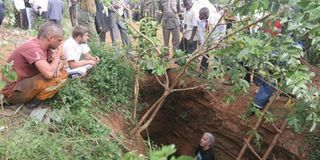In the risky mines of Migori, gold takes on a frightening glitter

Rescuers at a collapsed mine that trapped three diggers in Kisumu. The returns from mining are meagre, with brokers making the situation worse. FILE PHOTO | TOM OTIENO |
What you need to know:
- New Bill will expose the industry to new challenges.
- Extracting the metal is so dangerous and unprofitable that many have switched to fishing, farming and other activities.
The perilous gold mines have been described as tunnels of death, but the allure of instant wealth still attracts many Migori residents.
An incident-free day means a lot to county gold miners. Many have been trapped by landslides in dark tunnels while others have suffocated from fuel fumes emitted by generators that light the shafts.
Every evening a miner returns home safely, his family will likely converge for prayers, thanking the Almighty for the protection offered while underground.
Digging out the precious ore is so risky that some miners have opted to return to farming and fishing. Returns from mining are also meagre since brokers exploit the hard-working diggers.
“The money is little compared with the risks I expose myself to every day. I can hardly make ends meet with the Sh1,500 I’m paid monthly by our society,” said Paul Anyona, 46, a father of nine.
His colleague, Mr Isaac Ouma, 29, said sometimes they go into the pungent tunnels without nose masks, gumboots or gloves, exposing themselves to chest ailments since they constantly inhale rock dust.
Mining tunnels in Nyatike and Suna West constituencies include Mikeyi, Gor Maria, Osiri, Nyathoro, Akala, Mukuro and Shinyanga. They are guarded by villagers around the clock after it was discovered that some dealers returned at night and prospected for gold without relevant licences.
'HIGHLY DANGEROUS'
A number of companies have brought crushing equipment from Tanzania at a cost of about Sh250,000.These machines crush rocks into fine powder after which mercury is used to separate gold ore from the surrounding stone dust.
When the Sunday Nation visited one of the mines recently, Mrs Mary Adhiambo, 45, was handling mercury without any protection, oblivious to the risk.
Mining consultant Joshua Owino, 37, said a substance like mercury should not be handled without gloves.
“It is highly dangerous. We must address these safety concerns,” he said.
Miners are also said to be using dangerous explosives to extract the ore.
“We are faced with a new security challenge because youths may start using the explosives for criminal activities,” said a former police boss in Nyatike, Mr Richard Mukwate.
Mid last year, a secondary school teacher narrowly escaped death when his house in Migori town was attacked by a gang using explosives.
Governor Okoth Obado asked police to make sure explosives are not used in the mines.
“As a county government, we are formulating by-laws to streamline gold mining and make it safer and more profitable,” he explained.
Prospecting for gold in Mikeyi, Nyatike, began in the 1930s, led by officials of the British colonial government. The name Mikeyi is derived from the letters MK which stood for Mines of Kenya.
Colonial miners left Mikeyi in the 1960s on the orders of then powerful Economic Affairs minister Tom Mboya.
CHILD LABOUR
Child labour is rife in the region, and young children drop out of school to work in the mines.
Minerals and mining make a relatively insignificant contribution to the national economy which has depended on agriculture, tourism and manufacturing. But the situation is changing.
An upsurge in mineral exploration and an aggressive campaign by the Investment Promotion Centre could put Kenya on the verge of a mining breakthrough.
Mining is the economic mainstay of countries like the Democratic Republic of Congo (DRC), Ghana, South Africa and Zambia, but in Kenya legislation is proving to be a problem. Mining expert Julius Opiyo says the new Mining Bill is exposing the industry to new challenges.
“The proposed law has three categories of licences: artisanal, small, and large-scale mining permits. Artisanal permits are to be obtained at the county level, with a restriction on mechanisation, use of mercury and cyanide for leaching, and detonation of explosives,” said Joshua Owino, manager of Migori County Artisanal Mining Co-operative Society.
“It means there will be limited operation by small-scale artisanal miners who are the majority in Migori and Kenya. Currently we have export licences, but these will be revoked the moment the new Bill becomes law,” he said.
A gram of gold sells for Sh2,500 in the village and about Sh4,000 in Nairobi.
“Miners, most of whom are illiterate, are also exploited by an opaque grading system introduced by middlemen,” Mr Opiyo said.





